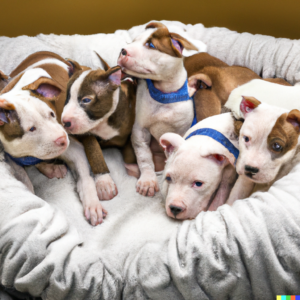How do you know if a pit bull is a true red nose pit bull?
The term “red nose pit bull” refers to a particular strain of the American Pit Bull Terrier breed that is characterized by its distinctive red nose. However, there is no official recognition of the “red nose” strain as a separate breed or sub-breed of the American Pit Bull Terrier.
To determine if a pit bull is a true red nose pit bull, you need to look at its lineage. Red nose pit bulls can be traced back to a limited gene pool of dogs that had the distinctive red nose. If a pit bull is from a bloodline that traces back to these original red nose dogs, then it is considered a red nose pit bull.
How rare is a red nose pit bull?
The term “red nose” in reference to pit bulls refers to a specific line or strain of American Pit Bull Terriers that is characterized by its red or reddish-brown nose. While not officially recognized as a separate breed, this strain of pit bulls is considered rare and is highly sought after by some dog enthusiasts. However, the rarity of red nose pit bulls is subjective and can vary depending on the region, as some areas may have a higher concentration of these dogs than others.
What is the lifespan of a red nose pit bull?
The average lifespan of a red nose pit bull is typically between 12 to 14 years. This is in line with the lifespan of other pit bull breeds and is similar to the lifespan of other medium-sized dog breeds. However, the lifespan of a red nose pit bull can be influenced by various factors, including genetics, diet, exercise, and access to veterinary care.
Proper care and a healthy lifestyle can go a long way in ensuring a longer lifespan for your red nose pit bull. This includes providing a balanced diet, regular exercise, and timely veterinary check-ups and treatments. By taking good care of your dog, you can help ensure a long, happy, and healthy life for your furry friend.
Are red nose pit bulls more dangerous or aggressive than other pit bulls?
No, red nose pit bulls are not inherently more dangerous or aggressive than other pit bulls or any other breed of dog. The temperament and behavior of a dog are determined by a combination of factors, including genetics, socialization, and training. There is no evidence to suggest that red nose pit bulls are any more dangerous or aggressive than any other pit bull or any other breed of dog.
In fact, pit bulls as a whole have a bad reputation due to media bias and misconceptions about the breed. The reality is that pit bulls, like any other breed of dog, can be loving, affectionate, and well-behaved when they are raised in a positive and responsible environment.
Where do you get a red nose pit bull?
You can obtain a red nose pit bull from various sources, including:
- Breeder: You can find breeders who specialize in breeding red nose pit bulls. It’s important to do your research and find a reputable breeder who is committed to responsible breeding practices and the health and well-being of their dogs.
- Shelter or rescue: Many red nose pit bulls end up in shelters and rescues, where they are in need of loving homes. Adopting a red nose pit bull from a shelter or rescue is a great way to give a dog a second chance, and you may be able to find a red nose pit bull in need of a home.
- Online classifieds: Websites like Craigslist and Facebook Marketplace sometimes have listings for red nose pit bulls. However, it’s important to exercise caution when buying a dog from an individual, as there is a risk of unknowingly supporting puppy mills or other inhumane breeding practices.

How much does a red nose pit bull puppy cost?
The cost of a red nose pit bull puppy can vary greatly depending on several factors, including the location, the reputation of the breeder, and the demand for the breed. On average, a red nose pit bull puppy can cost anywhere from $500 to $1,500 or more. High-end breeders may charge several thousand dollars for a red nose pit bull puppy.
It’s important to remember that the initial cost of a puppy is just the beginning. There are ongoing expenses associated with owning a dog, including food, toys, grooming, and veterinary care. Before purchasing a red nose pit bull puppy, it’s important to consider the long-term financial commitment required to provide proper care for your pet.
When considering purchasing a red nose pit bull puppy, it’s essential to choose a responsible breeder who is committed to the health and well-being of their dogs. Look for a breeder who provides a health guarantee and conducts genetic testing to ensure the health of their breeding stock. By choosing a responsible breeder, you can help ensure that you bring home a happy and healthy red nose pit bull puppy.
How big do female red nose pit bulls get?
The size of a female red nose pit bull can vary, but they are generally a medium-sized breed. On average, adult female red nose pit bulls typically weigh between 35 to 65 pounds and stand 17 to 21 inches tall at the shoulder. However, the size of a red nose pit bull can be influenced by various factors, such as genetics, diet, and exercise.
Are female pit bulls calmer?
There is no scientific evidence to suggest that female pit bulls are inherently calmer than male pit bulls. The temperament and behavior of a dog are determined by a complex interplay of factors, including genetics, socialization, and training.
How often do female red nose pit bulls bleed?
Female red nose pit bulls, like all female dogs, experience a cycle of heat that is characterized by bleeding. This cycle typically occurs every 6 to 12 months and lasts for approximately 2 to 3 weeks. During this time, the female dog will experience a bloody discharge from her vagina and may show increased affectionate behavior as well as a heightened interest in male dogs.
It’s essential to keep your dog clean and dry during this time, as excessive bleeding can lead to skin irritation and infection.
If you are not planning to breed your female red nose pit bull, it is recommended to have her spayed, which will prevent her from experiencing heat cycles and prevent unwanted breeding. Spaying can also have numerous health benefits for your dog and can help prevent certain reproductive-related diseases.
It’s important to consult with your veterinarian to determine the best course of action for your female red nose pit bull, including the timing of spaying and any other health-related concerns.
